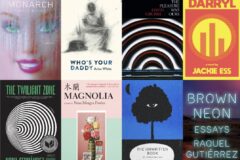Release Date: July 15, 2013
Label: Milan
Director Nicolas Winding Refn’s stoic and blood-splattered 2011 film Drive both revived that peculiar late-’60s/mid-’70s man + car genre (ranging from Steve McQueen-starring Bullitt to Walter Hill-directed The Driver) and proved that Ryan Gosling oozed sexuality even when portraying street-lit alabaster in a Scorpio jacket. Meanwhile, its soundtrack highlighted the icy productions of French-house upstart Kavinsky, as well as Johnny Jewel and his Italians Do It Better crew. But as that soundtrack reached its midway point, the boxy drum machines and mannequin vocals of Chromatics’ “Tick of the Clock” gave way to the cues of film composer Cliff Martinez, who conjured the ambience of the City of Angels come witching hour, when all turns to demons.
For punk and new-wave fans, Martinez is best known for drumming the gamut of Angeleno weirdos, from an early incarnation of the Red Hot Chili Peppers to the final iteration of Captain Beefheart and his Magic Band to the Weirdos themselves. He’s also long been Steven Soderbergh’s composer of choice, from the director’s 1989 debut sex, lies and videotape through 2002’s Solaris (and returning to the fold for 2011’s Contagion); but Drive was his coming-out party, catapulting Martinez into the vanguard of 21st-century Hollywood composers alongside the likes of Clint Mansell and Trent Reznor. That film’s haunting, iTunes-topping score benefitted greatly from its use of an obscure instrument called the cristal baschet, which consists of fiberglass amplification cones and a glass-rod keyboard that you play by moistening your fingers and gently caressing the glass. “It sounds like either the mothership is landing, or someone’s going to get killed,” the composer told the Los Angeles Times. Now, Refn-Gosling-Martinez have reconvened for Only God Forgives, featuring Gosling as a brooding drug smuggler with a triple whammy of Oedipal/Hamlet/penis-size issues as he slinks through the byways of Bangkok rather than L.A. Judging by initial reviews, though, everyone else may only forgive Martinez this time around: His score is a standout, an instant soundtrack classic. Composed with help from Gregory Tripi and Mac Quayle (as well as M83’s Anthony Gonzalez), it mostly forgoes the cristal baschet, but still finds alien (and alienating) tones in the form of twanging guitar, brass, and pizzicato strings, as well as saccharine-yet-strange Thai pop, relentless rainy-season percussion similar to Japanese Taiko drumming, and the metallophone tones of Indonesian gamelan.
Dreamy yet always on the razor’s edge of turning into a nightmare, the composer’s sound palette both widens and focuses here. In just 47 seconds, the opener and title track establishes the main theme via submarine-deep thuds, brass gurgles, and tympanum thunder before giving way to an array of gongs, chimes, and strings for “Ask Him Why He Killed My Brother,” all those timbres rendered expertly weightless. Similarly gorgeous is the ambient synthscapes of “Sister Part 1”; “Wanna Fight” features anxious synth arpeggios mixed with the venting of a pipe organ and a guitar line that seems to reverberate from a chasm. The string and woodwind arrangements on the two-minute “Do As Thou Will” are particularly striking, evoking Bernard Hermann at his most vertiginous (as on Psycho) and dreaded (as on Hermann’s final score, Taxi Driver), accumulating into black clouds before they deliver the main theme’s thunder. On “Ladies Close Your Eyes,” those portentous drums are again featured, though this time the plucked strings turn harrowing, scraping and shrieking like something from Penderecki’s “Threnody for Hiroshima.” That skin-flaying sound soon dissipates into a reverie via gongs and chimes for the track’s latter half, a doom-and-dream speedball.
It’s not all muggy atmosphere, though, as Martinez adds levity via detours into Southeast Asian pop forms, though not of the sort familiar to fans of Sublime Frequencies’ excursions. Muted trumpet, rolling piano, and woodblock clops accompany actor Vithaya Pansringarm’s turn on the stately ballad “Can’t Forget.” Actress Ratha Phongam’s vocal contribution, “Falling in Love,” hews closer to extravagant Chinese pop than more rustic Thai molam, all sugary strings and silken guitar lines.
Martinez’ finest scores have thrived in lightless atmospheres, as with Solaris, Contagion, Arbitage, or Drive. But while the latter drifted through dark ambience, the violence of titles like “Kick Your Teeth” and “Skull Crushing” was refined by the cristal baschet‘s sublime timbres; this score merges the brutal and beatific throughout. Disembodied drones mutate into roiling, volatile rhythms reminiscent of his recent work with Skrillex on Spring Breakers, though these feverish beats never break; there’s no pressure release of a “drop” in sight, no escape. The anxiousness and violence that courses through the rest of Only God Forgives finally give way to graceful closer “You’re My Dream,” those panicky rhythms now transformed into gentle tympani and a twinkling Thai lullaby. It provides a Hollywood ending to a film that is anything but, and will no doubt keep Martinez’s phone ringing.





